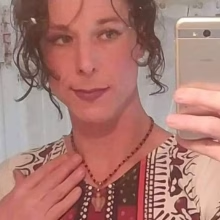October is LGBT History Month. I’ve asked several people to share their thoughts on regional historical events that left an impression on them. Some contributors are LGBTQ, some are allies. All are people I think you will enjoy hearing from this month. If you would like to submit a guest post, please click here. ~ Sue

It’s easy to think that the recent attacks on the LGBTQIA+ population are to blame on a certain person who currently sits in the White House. In truth, these hateful sentiments have always existed – they just are now coming out from being hidden behind hoods and masks.
Sue Kerr of this excellent blog asked if I’d write a post for LGBTQIA+ History Month. I unflinchingly said yes. But what to write about? Or who? Pittsburgh and the Southwestern Pennsylvania region have many, many people I could highlight: from authors like Gertrude Stein and Willa Cather, to activists such as Randy Forrester and Billy Hileman, academics and professionals like Richard Isay and Deborah J. Aaron, and today’s new generation of voices like Vanessa German, Ciora Thomas and Michael David Battle. Then, there are those who stood on the national stage: Evan Wolfson, who headed the Freedom to Marry Foundation. Rev. Janet Edwards, whose officiating of a lesbian wedding in 2005 led to charges being brought against her from the Presbyterian Church (those charges were dismissed). David Piergalski who was beaten to death in Schenley Park for being gay, nine years before Matthew Shepard was killed.
But my mind kept going back to a story I read in the Pittsburgh Post-Gazette in July of 2013. I could not remember what had ever happened to the event once it received publicity. Alex Zimmerman wrote the article for the July 6, 2013 edition: “Swastika, vandalized truck aimed at Sarver family.”
The Namey family in Sarver, Butler County, awoke to find a several-feet-long swastika burning on their lawn. Days earlier, their truck had been vandalized, covered in coins in the shape of an upraised middle finger, followed by a painted “U.” The truck had also been splashed with pink paint, the word “think” keyed into the paint, had two slashed tires, a broken antenna, a broken driver’s seat, and had “tobacco spit juice” dumped in the back. Their 16-year-old daughter had come out as a lesbian three years prior to these incidents. That was the only reason they could think of in regards to them being targeted. She had recently stopped riding the bus to school due to bullying, which is why they thought the truck was targeted, specifically.
Reports at the time stated the local police and the FBI were investigating the crime. Admittedly, crimes like these are rarely solved, so hoping for resolution was a tall order. But after the slew of articles about the incident, nothing. No follow-up. A week after, and all had forgotten it had ever happened, except the family, of course. How many of us today remember this?
Show your support for LGBTQ history documented through blogging with a donation.
And then, four years later, Donald Trump arrives. We are now seeing incidents of swastikas showing up on businesses, playgrounds, and more. We are seeing a resurgence of blatant racism, sexism, homophobia, transphobia, and ableism. What are we doing to counter these? What steps have you taken to make sure the families in your neighborhood know you’re an ally/accomplice? The United States was one of four countries that voted against a United Nations ban on the death penalty for homosexuality just this week. We’ve reached a point where our federal government is on the side that says it’s just peachy to kill people for being gay. What are you doing to tell them you’re angry at that?
Many people don’t pay attention to history. It, along with the other social sciences, is frequently cut from school programming when there are (far too many) standardized tests to prepare for. Others believe it has no relevance. But I firmly believe that studying history gives us an excellent way to see patterns in society, and address them. How can we move forward if we don’t know where we’ve been?
The next time you see a story such as the Namey’s, don’t stay silent. Don’t forget about it a week later. Reach out to who was involved. Help out – by attending a playground clean-up day, to helping a neighbor re-seed a lawn where something was burned, to giving money to groups which fight hate, especially those led by people of color. History may repeat itself, but how we react to it doesn’t have to.
Anne E. Lynch is the Manager of Operations at Three Rivers Community Foundation, which gives out grants to grassroots organizations working to create social, economic, and environmental justice in Southwestern Pennsylvania. She holds a BA in Anthropology and a minor in History from the University of Pittsburgh.
Discover more from Pittsburgh Lesbian Correspondents
Subscribe to get the latest posts sent to your email.














You must be logged in to post a comment.